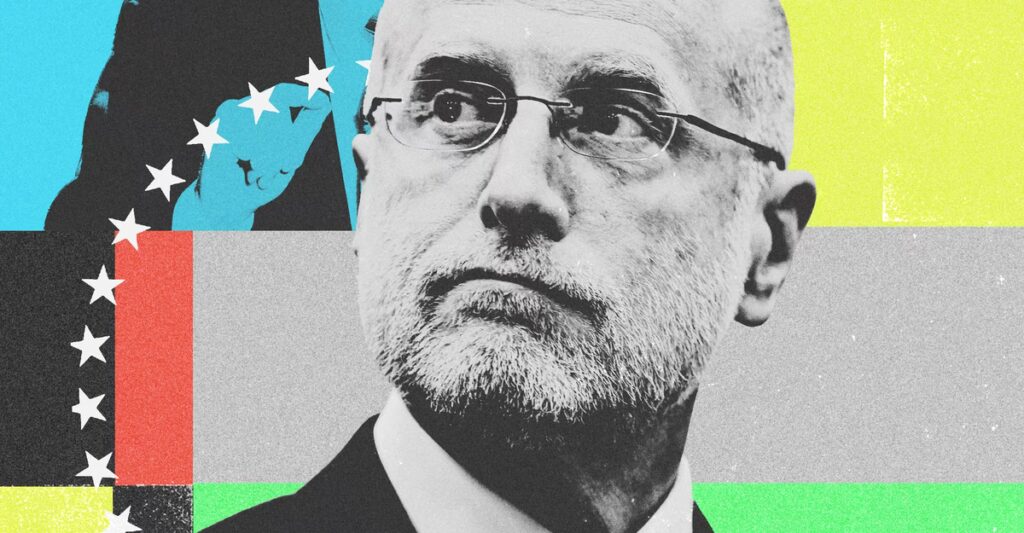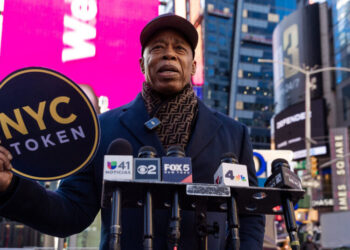The scandal that briefly made Brendan Carr a household name this fall was an outlier several times over. For one thing, FCC chairmen rarely make news. More than that, Carr usually knows better than to draw too much attention to himself. A seasoned bureaucrat, he has a knack for pulling the strings of power in ways that escape public scrutiny. But when he issued a mob-style threat over a Jimmy Kimmel monologue that Republicans didn’t like—“We can do this the easy way or the hard way”—he made the Trump administration’s appetite for censorship unignorable.
Most of the administration’s efforts to manipulate the media up to that point had retained at least a patina of deniability. Here, by contrast, was an uncomplicated threat of government interference—one that prompted Disney, ABC’s parent company, to fall in line by suspending Kimmel’s show. This was too much even for some of the Trump administration’s biggest cheerleaders; Senator Ted Cruz called Carr’s comments “dangerous as hell.” After a few days of public outcry, Kimmel was back on the air.
The whole episode was an unusual misstep by a skilled Washington operator. The hallmark of Carr’s tenure as chair of the Federal Communications Commission has been the exploitation of bureaucratic procedure to consolidate ownership of communications infrastructure in Trump-friendly hands, while keeping those actions out of both the court of public opinion and the literal courts. To liberals, this is an obvious attempt to rig the media. To conservatives, however, it is a long-overdue unrigging. Why should the national networks devote airtime every night to liberal comedians who incessantly mock Republicans? “For those that benefited from a two-tier system of justice, today’s even handed treatment feels like discrimination,” Carr posted on X in March, paraphrasing the economist Thomas Sowell. The left, in other words, got so used to controlling the media that it doesn’t even notice the bias.
“The public airwaves belong to the public, and yet for the past 40 or 50 years, they have been used and abused as a propaganda tool for one party’s political agenda,” Daniel Suhr, the president of the Center for American Rights, a conservative litigation nonprofit, told me. “It doesn’t matter whether you’re watching NBC, ABC, CBS, or PBS; you’re going to get the same left-wing viewpoints permeating both the news and the entertainment shows.”
Conservatives have been complaining about media bias for decades, but Republican officials were long averse to interfering with the decisions of private companies. Then came the second Trump administration, and its willingness to wage cultural warfare in more intrusive ways. Carr’s role in that effort is not to tell networks what to air and whom to fire. It’s to get to the point where he doesn’t have to.
[Adam Serwer: The Constitution protects Jimmy Kimmel’s mistake]
Carr is bald, with a trim white beard and rimless glasses, which makes him look older than his 46 years. A D.C. lifer, he was born in the capital, went to college at Georgetown, and got his law degree at Catholic University. He joined the staff of the FCC in 2012, while in his early 30s, and never left. In 2017, President Donald Trump nominated him to serve as one of the five commissioners. (Carr did not respond to multiple interview requests, and the FCC press office did not reply to a request for comment.)
During this period, Carr was not considered particularly ideological. “He and I started at the FCC around the same time, and he was pretty much a typical Republican staffer,” Gigi Sohn, a Democrat who was nominated but not confirmed for a seat on the commission during the Biden administration, told me. Colleagues from both parties found him smart, funny, and pleasant to work with. “I’ve always had an excellent relationship with Brendan, and I always respected his intelligence,” Tom Wheeler, who chaired the agency under Barack Obama, told me. “He used to call me up after I left office: ‘Let’s go get lunch.’”
The current version of Carr—outspoken, politically ambitious, highly partisan—seems to have emerged in 2020. That May, Trump directed the FCC to “clarify” the meaning of Section 230 of the Communications Decency Act, the law that shields internet platforms from liability over their content-moderation policies. Republican dogma held that the major tech platforms were censoring conservatives, but the party remained divided over whether the government should get involved. “We should all reject demands, in the name of the First Amendment, for private actors to curate or publish speech in a certain way,” said Mike O’Rielly, one of the other Republican commissioners, in public remarks that summer. A few days later, the White House pulled his nomination for another term on the commission. (O’Rielly did not respond to interview requests.)
Carr took a different tack. In op-eds and at conferences, on cable news and podcasts, he advocated for Trump’s idea, even though most legal experts agreed that the FCC had no authority to reinterpret Section 230. He also began “embracing a flavor of distinctly Trumpian rhetoric,” as Politico put it in June 2020, “that could help him leapfrog his way to the chairmanship of the five-member regulatory agency.” Carr earned attention and retweets from the president by taking rhetorical shots at a range of real and perceived Trump foes, including the World Health Organization (“beclowned”), Adam Schiff (running a “secret and partisan surveillance machine”), and the “far left” in general (going “from hoax to hoax to hoax to explain the loss at the ballot box”).
“He obviously has a natural talent for messaging and doing the press, which has surprised a lot of people who knew him way back when he was in the doldrums of the FCC,” Evan Swarztrauber, a telecom-policy consultant who worked as an adviser to Carr during the first Trump administration, told me.
During the Biden administration, while in the commission’s minority, Carr contributed a chapter to Project 2025, the Heritage Foundation manifesto that has served as a blueprint for much of the second Trump administration. Compared with other parts of the document, Carr’s contribution isn’t particularly radical. It focuses mostly on countering the threat of Chinese technological espionage and reining in Big Tech by reforming Section 230. (As chair, Carr has pursued the first part of that agenda energetically; the preemptive capitulation of the princes of Big Tech rendered the second part unnecessary.) The chapter contained almost no mention of what has turned out to be the most important power he would actually wield.
Media regulation in the United States has historically been a hands-off affair. For the most part, the First Amendment lets the FCC police “obscenity, indecency and profanity,” and little else. Until recently, if the agency made headlines, it was probably because something naughty, such as Janet Jackson’s exposed right breast, had made its way onto the airwaves.
The FCC normally focuses more on the infrastructure of communications. Its docket is stuffed with such vital but dry topics as 5G coverage and rural broadband. Even the controversy over “net neutrality,” which inflamed internet-policy nerds for years, turns on the achingly technical question of whether ISPs are properly classified as “information services” or “telecommunications services” under federal law. The FCC does not print money, bring lawsuits, or command armed agents. A pamphlet published by the agency in 2010 analyzes some of the “most critical” decisions in its history. These include “spectrum allocations and color standards for over-the-air television in 1945 and 1952,” “authorizing customers in 1968 to attach equipment to their telephone lines,” and “adopting technical standards for high-definition and digital television in 1996 and 1997.”
Beneath the mountains of tedium, however, lies real power. Whoever controls communications infrastructure can shape the informational environment. Using that power to advance political objectives requires someone with both technocratic know-how and the ambition to use it. According to friends and detractors alike, Carr is that person. “He knows the law very well, and he knows how to get results under the law without running afoul of it,” Swarztrauber told me.
The FCC’s authority arises from its control of a scarce public good. Because wireless spectrum is a finite resource (only one radio station can occupy a given frequency in a given location, for example), the federal government allocates and regulates its use: not just for radio but also for broadcast television, satellites, and cellphones. “Spectrum is the most valuable asset that the government owns in the information economy, period, end of story,” Blair Levin, a former FCC attorney who oversaw the Obama administration’s National Broadband Plan, told me.
Recipients of FCC broadcast licenses are required by law to operate in “the public interest, convenience, and necessity.” Only once, however, has the FCC revoked a license on these grounds, in a court-ordered 1969 decision concerning a southern TV station that refused to air news about the civil-rights movement. More recently, in 2018, a group of Democratic senators urged the agency to investigate Sinclair, then the country’s biggest TV-station owner. The company had ordered dozens of local-news anchors to read identical scripts repeating Trump talking points about media bias and “fake stories.” In a letter, the senators warned that Sinclair might be “deliberately distorting news by staging, slanting, or falsifying information,” putting its licenses at risk. But the letter was a transparent messaging exercise. Ajit Pai, the agency’s Republican chair, was never going to revoke Sinclair’s licenses. Neither did his successor, the Joe Biden appointee Jessica Rosenworcel.
[James Surowiecki: Nexstar and Sinclair lost their game of chicken]
Carr, by contrast, has made no secret of his desire to make aggressive use of the public-interest standard. “Broadcast licenses are not sacred cows,” he declared on X in November 2024. One of his first acts as chair was to reopen a previously dismissed complaint accusing CBS News of “news distortion” over its editing of a 60 Minutes interview with Kamala Harris, along with complaints against ABC and NBC. These proceedings were unlikely to go anywhere. Broadcast licenses belong to individual stations, not the big networks that produce the programming. Even if the FCC tried to revoke a station’s license over claims of partisan bias, that move would likely be overturned in court.
But Carr has another method available with the advantage of being legally unreviewable. The FCC must approve any merger that involves the transfer of broadcast licenses. If the agency were to vote to block a merger for ideological reasons, the companies involved could sue—perhaps on First Amendment grounds, perhaps on the grounds that the agency’s reasoning violated the Administrative Procedure Act, which forbids “arbitrary” and “capricious” policy making. But if the merger never comes up for a vote, there’s nothing to challenge. And whether that happens is the chair’s call.
“Being chairman of the FCC is one of the best jobs in Washington because you run the agency,” Wheeler told me. “There are four other commissioners, but those commissioners never get a chance to vote on something that the chairman hasn’t already decided they should put on the agenda.”
When Carr reopened the CBS News complaint, the network’s parent company, Paramount, was in the process of being bought by Skydance Media, controlled by David Ellison, the son of the billionaire Trump supporter Larry Ellison. The informal 180-day window for the FCC to approve the license transfers came and went without Carr putting the deal on the agenda. Finally, on July 1, CBS News agreed to pay $16 million to Trump’s presidential-library fund to settle his personal lawsuit over the 60 Minutes interview. Trump insisted that this had nothing to do with the merger, but a few weeks later, the acquisition was approved. Carr denied having slow-walked the deal, but proudly announced that the network’s new owner had been required to commit to various ideology-focused reforms, such as appointing an ombudsman to watch out for bias. “One thing that CBS has agreed to do as part of this transaction is to bring more fact-based, objective, unbiased coverage to their newsrooms,” Carr told PBS. Ellison has since hired Bari Weiss, the founder of the conservative-leaning publication The Free Press, to head CBS News.
Democrats who knew Carr from his early days at the FCC were appalled. “What’s going on here is using the power of a so-called independent agency to make the president happy and resolve his grievances,” Gigi Sohn said. “And that’s absolutely not what the agency is supposed to be about.” Conservative activists, however, were thrilled. “I think what Chairman Carr accomplished through the Paramount proceeding is a great example of how we move toward more balance, more ideological diversity, and in doing so really serve more customers,” Daniel Suhr, whose organization filed the news-distortion complaint, told me.
The key point is that if Carr indeed delayed a vote on the merger until CBS News made its concessions, his decision could not be challenged in court. “He has perfected a technique where avoiding the process of the Administrative Procedure Act gives him unappealable power,” Wheeler said. “It’s a hell of a technique.”
If the Skydance-Paramount merger doesn’t strike you as sufficiently technical and bureaucratic, consider the case of Charlie Ergen and Elon Musk. In 2019, as part of a merger approval, the government required Sprint to sell some of its wireless-spectrum licenses to Ergen’s satellite-TV company, Dish Network. Dish, which Ergen has since merged into a company called EchoStar, would have until 2025 to build out a new national cell network, or it could be forced to forfeit the valuable spectrum it had purchased.
In 2024, the Biden FCC granted the company an extension. But Musk coveted some of the spectrum that EchoStar controlled—specifically, on the 2-gigahertz band, which is ideal for “direct-to-cell” satellite service. In April, his company SpaceX sent a letter to the FCC accusing EchoStar of not meeting its build-out obligations and urging the agency to take action.
One month later, Carr sent Ergen a letter suggesting that the FCC might overturn the extension that his company had already received. Some of the letter’s key passages consisted of impenetrable jargon. “I have also asked agency staff to issue a public notice seeking comment on the scope and scale of MSS utilization in the 2 GHz band that is currently licensed to EchoStar or its affiliates,” Carr wrote. But the message was clear. “The FCC threatens such severe sanctions that they put EchoStar’s financial viability in question and threaten to kill the company,” Nathan Simington, a fellow Republican who had recently resigned his seat on the commission, wrote in an op-ed criticizing the investigation.
Ergen tried to meet with Carr, to no avail. Finally, Chris Ruddy, the CEO of Newsmax—grateful that Dish had kept his right-wing network on the air when other broadcasters had not—brokered a White House meeting with Trump, according to the New York Post. The president arranged a deal: EchoStar would sell some of its spectrum to AT&T for $23 billion, and some to SpaceX for $17 billion. Trump’s largest campaign contributor got the spectrum he craved, and Ergen got an enormous payout.
Carr hailed the agreement as “a potential game changer for the American consumer.” But an editorial by the conservative Wall Street Journal editorial board decried the backroom deal, arguing that the administration’s “rampant regulatory intervention in markets on behalf of businesses that do their bidding is giving Democrats the evidence to build a case that Republicans are the new kings of crony capitalism.”
If Carr had tried to formally order Ergen to give up the spectrum, Ergen might have successfully sued. But that would have taken years, by which time he would have long gone bankrupt. Instead, the deal was brokered behind closed doors, with no agency vote for anyone to challenge. “Brendan Carr is smart,” Sohn said. “He’s been at the FCC since 2012, so he knows how these things work. None of these things are reviewable.”
Through September, Carr’s tenure was marked by an unflashy use of the levers of bureaucratic power to deliver wins for Trump and his allies. Then came l’affaire Kimmel. A few days after Charlie Kirk’s assassination, Kimmel falsely implied that the killer was a Trump supporter: “We hit some new lows over the weekend,” he said in his opening monologue, “with the MAGA gang desperately trying to characterize this kid who murdered Charlie Kirk as anything other than one of them.”
A right-wing campaign arose to get Kimmel taken off the air. Two days after the offending monologue, Carr, in an interview with the right-wing podcaster Benny Johnson, made his famous “the easy way or the hard way” comment. This was widely interpreted as a threat directed at ABC, which airs Jimmy Kimmel Live, and the broadcast affiliates around the country that carry it. Later that day, Nexstar and Sinclair, which together operate about a quarter of the country’s ABC affiliates, announced that they would replace Kimmel with other programming. (Nexstar is considered conservative-leaning, though less aggressively so than Sinclair.) Soon thereafter, ABC announced that Kimmel was suspended indefinitely. Carr gloated by sharing celebratory GIFs on X. In a CNBC interview the day after the suspension, he evaded questions about whether he was responsible for taking Kimmel off the air while suggesting that he would have been justified for doing so. “Broadcast is different” from online speech, he explained. “They’ve got a license, and they’re free to go on the internet and do whatever they want. But if they want to keep access to those valuable airwaves, I’ve been clear: We’re reinvigorating the FCC’s enforcement of public interest.”
[Paul Farhi: Brendan Carr’s half-empty threat]
Carr might have underestimated how much backlash the move would generate. Less than a week after suspending him, Disney abruptly put Kimmel back on the air. As public opinion turned, Carr and his allies offered a mix of defenses: Kimmel had in fact been suspended because of poor ratings; Democrats had done worse, anyway, such as with the 2018 letter accusing Sinclair of news distortion; how could the suspension have been censorship if Kimmel was back on the air a few days later? These did not quell the outrage. Carr seemed to dial back his media appearances. His X inbox, which had been open to DMs from anyone, went private. He kept a low profile as, inevitably, the public’s attention moved on.
Carr has not gone away, however. If anything, the episode only proved his point that the national networks have too much leverage over local broadcast affiliates. Sinclair and Nexstar had wanted to extend the Kimmel boycott, but they couldn’t. ABC, with its control of must-have properties such as Monday Night Football, held the advantage.
Shifting that balance of power seems to be Carr’s next big project. At the time of the Kimmel controversy, it was widely observed that Nexstar was seeking FCC approval to acquire Tegna, another large chain of affiliates, for $6.2 billion. This fact actually understates the FCC’s leverage. Under federal law, no company can own TV stations that reach more than 39 percent of American households. The Nexstar merger would take the combined company all the way to 80 percent. “The deal that Tegna and Nexstar signed is an illegal transaction,” Wheeler told me. “Yet they still went ahead and did the deal, because Carr has been indicating that he will change that rule.” As of late October, Carr said he hadn’t decided whether to raise the ownership limit. But Tegna and Nexstar clearly believe they have good reason to think the change will go through.
Carr has also long been suspicious of local ownership limits. Currently, one company can own up to two stations within a given market. On September 30, the FCC announced the first step of the process to amend those rules. (Both changes will require commission votes and thus are sure to be challenged in court. The 39 percent national cap is written into statute; whether the FCC can change it without an act of Congress is disputed.)
Carr has a perfectly nonpartisan rationale for these moves. He argues that allowing more mergers will make broadcasters more efficient and resilient, giving them more bargaining power against the ABCs of the world. “The agenda that I’m trying to run at the FCC is to empower those actual local television stations to serve the public interest,” he told CNBC in May. “Because what we’ve seen is, you’ve got national news media—ABC, NBC, CBS—and they’re exercising more and more control over those local TV stations. I don’t think that’s a good thing for the country, so we’re trying to reverse that.” According to Swarztrauber, Carr’s professed concern for local broadcasters is sincere. “I was working for him in 2018, and he believed that broadcasting was going to go the way of the newspaper if the FCC didn’t deregulate it,” he told me. “He was saying that in 2018.”
Still, allowing more mergers will, by definition, concentrate the “local” TV market even more heavily in the hands of a few national companies—companies that just so happen to have a rightward slant. They will know whom to thank for their good fortune. In the age of cable, social media, and streaming, broadcast TV is of course far less consequential than it once was. But even as it declines, it still commands a significant audience, especially among older Americans. As Carr himself is very fond of pointing out, local news enjoys much higher levels of trust than the rest of the media.
And broadcast TV is just one part of a multipronged effort. Skydance, fresh off of absorbing Paramount, is the favorite to acquire Warner Bros. Discovery in a mega-deal that would give the Ellison dynasty control over dozens of cable networks, including CNN. Meanwhile, Rupert Murdoch’s Fox Corporation and Larry Ellison’s Oracle are among the investors expected to have control over the American version of TikTok; Oracle would oversee the algorithm that recommends videos to users. (The final details of the pending Trump-brokered deal with China remain hazy.)
Developments such as these, along with Silicon Valley’s rightward shift and the ideological concessions in higher education, bring the MAGA movement closer to realizing a long-held dream: using state power to achieve cultural power. Many Republicans believe that media bias has given Democrats an unfair political advantage, and that once they correct that imbalance, they will reap electoral rewards.
They might be right about that. If you can shape what people see and hear, you can influence their beliefs. But the relationship between culture and politics is not always so straightforward. Liberal hegemony within media, education, and entertainment might very well be the reason the Democratic Party finds itself so out of touch with, and disliked by, broad segments of the American public. Carr and his allies might someday discover that being the establishment is not all it’s cracked up to be.
The post The ‘Easy Way’ to Crush the Mainstream Media appeared first on The Atlantic.




